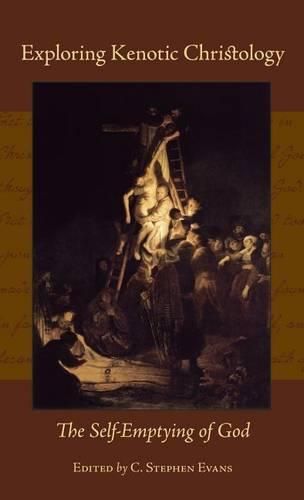Readings Newsletter
Become a Readings Member to make your shopping experience even easier.
Sign in or sign up for free!
You’re not far away from qualifying for FREE standard shipping within Australia
You’ve qualified for FREE standard shipping within Australia
The cart is loading…






This collection of essays, by a team of of Christian philosophers, theologians, and biblical scholars, explores the viability of a kenotic account of the incarnation. Such an account is inspired by Paul’s lyrical claims in Philippians 2:6-11 that Christ Jesus though God in nature, ‘emptied himself’ or ‘made himself nothing’ by becoming human. The biblical support for such a view can be found throughout the four gospels, and the book of Hebrews, as well as in other places. A kenotic account takes seriously the possibility that Christ in becoming incarnate, temporarily divested himself of such properties as omnipotence, omniscience, and omnipresence. Several of the contributors argue that this view is fully orthodox, and that it has great strengths in giving us a picture of God who is willing to become completely vulnerable for the sake of human beings, and one that is completely consistent with the very human portrait of Jesus in the New Testament. The proponents of kenotic Christology argue that the philosophical accounts of God’s nature that have led to rejection of this theory ought themselves to be subjected to criticism in light of the biblical data. Some essays test the theory by raising critical questions and arguing that traditional accounts of the incarnation can achieve the goals of kenotic theories as well as kenotic theories can. The book also explores the implications of a kenotic view of the incarnation for philosophical theology in general and the doctrine of the Trinity in particular, and it concludes with essays that examine the validity of the ideal of kenosis for women, and a challenge to traditional Christology to take a kenotic theory seriously. CONTRIBUTORS: C. Stephen Evans, Gordon D. Fee, Sarah Coakley, Stephen T. Davis, Ronald J. Feenstra, Bruce N. Fisk, Ruth Groenhout, Edward T. Oakes, SJ, Cornelius Plantinga, Jr., Thomas R. Thompson, Edwin Chr. van Driel.
$9.00 standard shipping within Australia
FREE standard shipping within Australia for orders over $100.00
Express & International shipping calculated at checkout
This collection of essays, by a team of of Christian philosophers, theologians, and biblical scholars, explores the viability of a kenotic account of the incarnation. Such an account is inspired by Paul’s lyrical claims in Philippians 2:6-11 that Christ Jesus though God in nature, ‘emptied himself’ or ‘made himself nothing’ by becoming human. The biblical support for such a view can be found throughout the four gospels, and the book of Hebrews, as well as in other places. A kenotic account takes seriously the possibility that Christ in becoming incarnate, temporarily divested himself of such properties as omnipotence, omniscience, and omnipresence. Several of the contributors argue that this view is fully orthodox, and that it has great strengths in giving us a picture of God who is willing to become completely vulnerable for the sake of human beings, and one that is completely consistent with the very human portrait of Jesus in the New Testament. The proponents of kenotic Christology argue that the philosophical accounts of God’s nature that have led to rejection of this theory ought themselves to be subjected to criticism in light of the biblical data. Some essays test the theory by raising critical questions and arguing that traditional accounts of the incarnation can achieve the goals of kenotic theories as well as kenotic theories can. The book also explores the implications of a kenotic view of the incarnation for philosophical theology in general and the doctrine of the Trinity in particular, and it concludes with essays that examine the validity of the ideal of kenosis for women, and a challenge to traditional Christology to take a kenotic theory seriously. CONTRIBUTORS: C. Stephen Evans, Gordon D. Fee, Sarah Coakley, Stephen T. Davis, Ronald J. Feenstra, Bruce N. Fisk, Ruth Groenhout, Edward T. Oakes, SJ, Cornelius Plantinga, Jr., Thomas R. Thompson, Edwin Chr. van Driel.